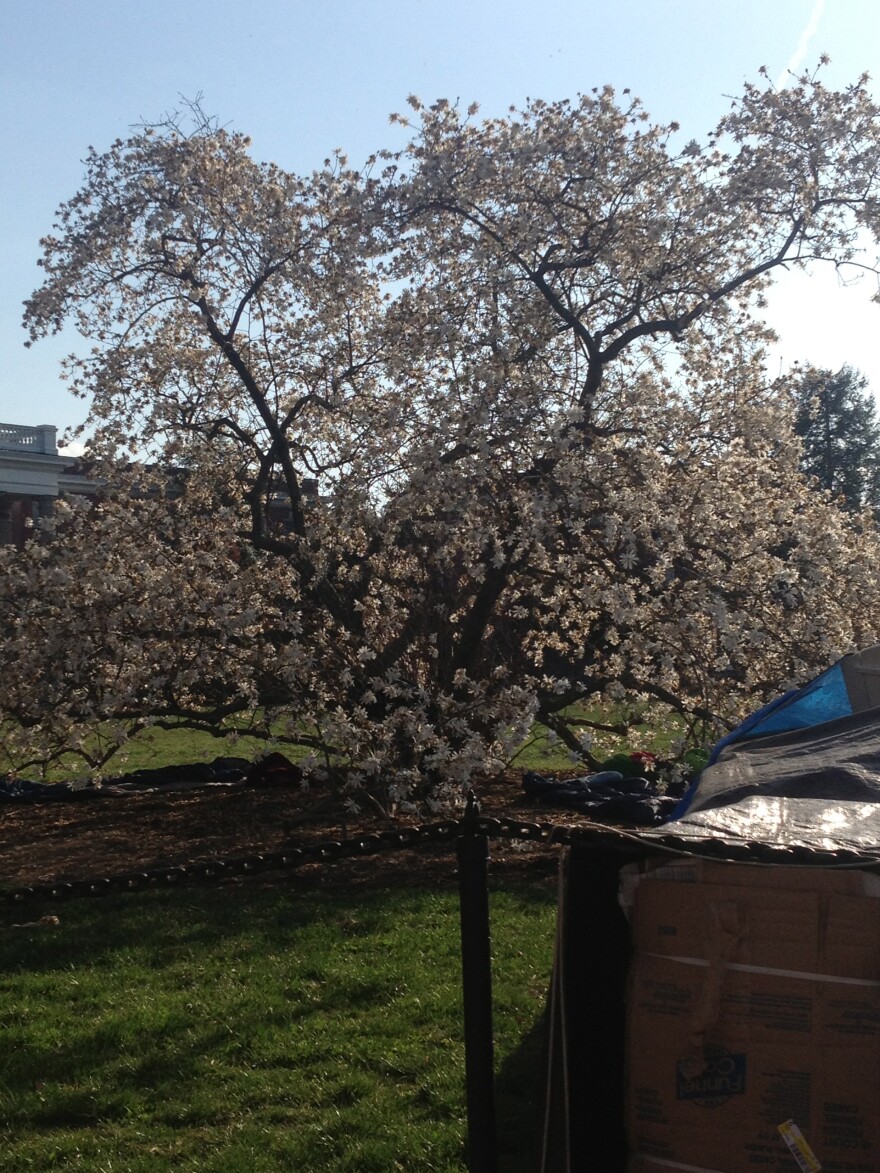This week’s rain was good news for farmers and gardeners, but at the University of Mary Washington, it was a bit - upsetting. More than 80 students are living outside this week - in cardboard boxes and makeshift tents - learning how it might feel to be poor.
“We may need another tarp but we also need twine, and we need something to prop the middle of the tarp up.”
Professor Shawn Humphrey’s job description said nothing about camping - or construction, but this week, he and dozens of students built a shelter from things they found in the trash, as part of the annual Two Dollar Challenge. Humphrey, who teaches economics, launched the program nine years ago to help students recognize the problems of the poor, and to debunk the popular notion of what people with money could do.
“We have the expertise, we have the technology. All we have to do is jump in and fly over and bam -- it’s done. It’s perpetuated by our celebrities, it is driven by the media, it’s perpetuated from generation to generation. We’ve been told over and over again that we are the generation that will end poverty.”
In fact, Humphrey says, people with money can play a limited role - one that respects the innate intelligence of those who struggle to survive on limited resources.
“There are local leaders solving local problems every single day. None of us have ever had to solve our own poverty, so why do we believe we understand how to solve someone else’s?”
Nearly half of the world’s population lives on less than two dollars a day, so participants in this program, including Mary Washington’s president and several administrators, are shopping at the Dollar Store for food.
“Beans and just a pack of ramen. I was also thinking that, because that’s five for a dollar.”
Senior James Hutcheson is taking part in his fourth Two Dollar Challenge - learning, again, how hard it is to function when you’re hungry.
“When I have to still go to school and you still have to do work, and when you don’t have the energy to do much of anything, it’s a really excellent learning opportunity for students who’ve never had to experience hunger.”

They used to raid the dumpster of a local bakery for perfectly good bagels, but then they realized that homeless, hungry people from Fredericksburg were counting on that resources, so dumpster diving is out.
Another veteran of the challenge, Courtney Prentice, says living outside, at the center of a busy campus, is not like camping in the woods.
“You don’t get any privacy. Whenever there’s tour groups, they poke their heads in and see what you’re doing, and you’re just trying to do homework. You realize that your mood is heavily dependent on the weather and you can’t escape the weather , and you realize that even if it’s warm out in the day, it’s very cold at night, even in the late spring.”
And Jeff Paddock, who lost eight pounds during one of his four years in the program, says it’s not easy to be a college student with no cash. He can’t use his cell phone, his laptop or tablet.
“You can use whatever public facilities there are - a public library computer, public showers, but I won’t be able to buy shampoo.”
The program has spread to twenty other colleges and universities and a half dozen organizations. It has also evolved to provide experienced participants with a new challenge. Professor Humphrey wants them to understand that in addition to earning less, the poor can’t always count on a steady income.
“We have designed a two dollar challenge app. You check on your phone. You get your daily income. It could be zero, one or three, and in addition to that in the advanced group you will receive economic shocks throughout the day.”

Like unexpected medical bills. Each night, there are discussions of what students learn and how they might change as a result of this five-day experience. In addition to learning, students spend this time fundraising for a micro-loan program they run in Honduras. It enables low-income families to start and grow businesses that help them escape poverty and employ others.
Check out this https://vimeo.com/40084792">video for more information on the $2 Challenge.




